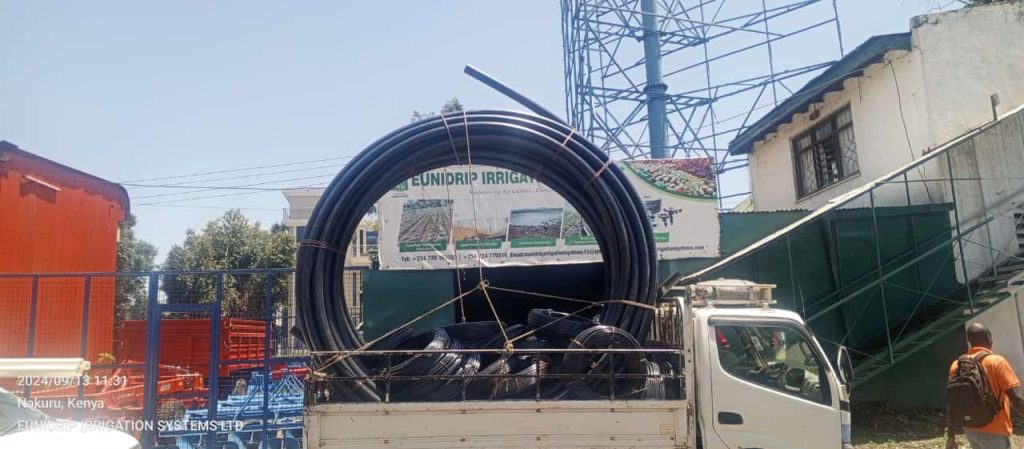Eunidrip Irrigation Systems is a leading supplier of irrigation pipes for sale in Kenya, catering to both large-scale and small-scale farmers. We offer a wide range of high-quality pipes, customized to meet the specific needs of Kenyan farmers. Our irrigation pipes are durable, UV-resistant, and made from materials designed to withstand the harsh African climate, ensuring long-lasting performance in any farming environment.
Table of Contents
Benefits of Using Eunidrip Irrigation Pipes in Kenya
Our irrigation pipes are made from tough, UV-resistant polythene material, designed to endure direct sunlight and other extreme environmental conditions. This makes them ideal for both open-field and greenhouse farming. Additionally, the pipes come in various sizes and fittings, allowing farmers to easily install them in any type of terrain or irrigation system.
Types of Irrigation Pipes for Sale
At Eunidrip Irrigation Systems, we offer various types of irrigation pipes that are categorized based on the material they are made of, their durability, and their size. Below is an overview of the key types of water pipes we offer:
1. HDPE Pipes
High-Density Polyethylene (HDPE) pipes are some of the most popular irrigation pipes in Kenya due to their flexibility, strength, and durability. HDPE pipes are commonly used to deliver water for irrigation because they:
- Are highly flexible, making it easy to install them in different terrains.
- Can be easily cut and drilled for making connections.
- Are resistant to bursting, even under high water pressure, making them suitable for long-term use.
Connection Methods: HDPE pipes are joined through heat fusion, where the pipe is heated and expanded to fit into another. This ensures a secure, leak-proof connection. Installation methods include open trench, drop burial, and directional bore.
2. PVC Pipes
PVC (Polyvinyl Chloride) pipes are another popular option for irrigation systems. These pipes are lightweight, corrosion-resistant, and UV-resistant. They are commonly used for transporting water, sewage, and other fluids.
- Advantages:
- Corrosion-resistant, ensuring a longer lifespan.
- Resistant to UV radiation, preventing degradation from exposure to sunlight.
- Available in a wide range of sizes and diameters.
- Fittings: PVC pipes come with a variety of fittings such as couplings, elbows, and tees to ensure flexibility and versatility in installation.
3. Polythene Tubing (Poly Pipe)
Polythene tubing, also known as poly pipe, is commonly used in small-scale irrigation systems. These pipes are made from flexible plastic materials, making them easy to handle during installation.
- Benefits:
- Resistant to corrosion and UV radiation.
- Available in different sizes, with diameters ranging from ¼ inches to 2 inches.
- Suitable for use with various poly pipe fittings, including couplings, elbows, adapters, and tees.
4. Swing Pipes
Swing pipes are commonly used to connect pop-up sprinklers and rotors to PVC or HDPE mainlines in irrigation systems. They are thicker than regular pipes, providing extra strength and protection against bursting or detachment under high water pressure.
- Application: Swing pipes are ideal for use in areas where flexibility and reliability are needed, such as lawn irrigation systems or small-scale garden irrigation setups.
Advantages of HDPE Pipes for Irrigation
HDPE pipes are the most efficient and effective pipes for irrigation, as they can withstand both high and low temperatures, making them suitable for use in all seasons. Whether you’re dealing with cold winters or hot summers, HDPE pipes will continue to deliver water efficiently without bursting or degrading.
Prices of Irrigation Pipes in Kenya
Below are the prices for some of the most common sizes of irrigation pipes available at Eunidrip Irrigation Systems:
| Size | Price for 100 m (KES) |
| 16 mm | 1,500 |
| 20 mm | 2,500 |
| 25 mm | 2,800 |
| 32 mm | 4,800 |
| 40 mm | 7,000 |
| 50 mm | 10,000 |
| 63 mm | 15,000 |
These prices are competitive and reflect the high quality of the irrigation pipes we offer. Our pipes are designed to provide value for money by reducing maintenance costs and ensuring long-term use.
Why Choose Eunidrip Irrigation Systems?
- Quality Products: We ensure that all our irrigation pipes meet international standards for durability and performance.
- Customization: Our pipes come in various sizes, and we can customize them to fit your specific irrigation needs.
- Expert Advice: Our team of experts is always available to offer advice and support on selecting the right type of irrigation pipe for your farm.
- Affordable Prices: We offer some of the most competitive prices in Kenya, ensuring that farmers can access quality products without breaking the bank.
Irrigation Pipe Fittings Available at Eunidrip Irrigation Systems
To complement our range of pipes, we also provide a wide variety of irrigation pipe fittings, including:
- Couplings: Used to join two sections of pipe, ensuring a secure and leak-proof connection.
- Elbows (45° and 90°): Used to change the direction of water flow within the irrigation system.
- Tees: Ideal for branching water flow in different directions.
- End Caps: Seal off the end of a pipe to prevent water from escaping.
- Reducers: Used to connect pipes of different diameters, allowing for effective flow management.
- Saddles: Allow for easy branching of water lines without cutting the main pipe.
- Ball Valves: Control water flow by opening or closing sections of the irrigation system.
Where to Buy Irrigation Pipes in Kenya
If you’re looking for high-quality irrigation pipes in Kenya, Eunidrip Irrigation Systems is your best choice. We have branches in Eldoret and Nairobi, making it easy for farmers across the country to access our products.
We pride ourselves on offering the best irrigation pipes and fittings at the most affordable prices. Whether you need HDPE pipes, PVC pipes, polythene tubing, or swing pipes, we have a wide selection to meet your irrigation needs.
Irrigation Pipe Sizes in Kenya
When it comes to setting up an efficient irrigation system, one of the most crucial factors to consider is the size of the irrigation pipes. The pipe size determines the volume of water that can be delivered to crops, and it directly impacts the overall performance of the irrigation system.
What is Pipe Size?
The pipe size refers to the internal diameter of the pipe. This diameter dictates the volume of water that the pipe can transport at any given time. The larger the internal diameter, the more water the pipe can carry, but this also means that the pipe will be more expensive. Larger pipes are essential for larger farms or systems requiring high water output.
At Eunidrip Irrigation Systems, we offer a variety of HDPE and PVC irrigation pipe sizes to meet the needs of different farming operations. Our available pipe sizes include:
Common Irrigation Pipe Sizes:
- 16mm
- 25mm
- 32mm
- 40mm
- 50mm
- 63mm
- 75mm
- 90mm
- 110mm
- 125mm
- 140mm
- 160mm
- 180mm
- 200mm
- 225mm
- 250mm
- 280mm
- 315mm
- 355mm
- 400mm
- 450mm
- 500mm
- 560mm
- 630mm
Why Pipe Size Matters
The internal diameter of an irrigation pipe plays a critical role in determining how much water can flow through the system. For example, a grower irrigating 100 acres of land will require much larger pipes than someone irrigating a single acre, even if the crops are the same. This is because more water is needed to cover the larger area, and larger pipes ensure that enough water reaches every section of the farm.
- Smaller pipes (such as 16mm to 50mm) are typically used for small-scale farms, drip irrigation systems, or areas with lower water pressure needs.
- Larger pipes (ranging from 63mm to 630mm) are more suited for large-scale irrigation operations or areas requiring significant water flow.
Choosing the Right Pipe Size for Your Farm
When selecting irrigation pipe sizes, consider the following:
- Land Size: Larger areas require larger pipes to deliver sufficient water. For instance, if you’re irrigating vast fields, you will need a larger internal pipe diameter to maintain effective water flow.
- Crop Type: Different crops have different water needs. High-water-demand crops like sugarcane or rice may require larger pipes compared to crops like vegetables or fruits.
- Water Pressure: Higher water pressure allows smaller pipes to carry more water, but for low-pressure systems, a larger pipe may be necessary to achieve the required flow.
- System Type: For drip irrigation systems, smaller pipes are often used to distribute water directly to the plants’ roots, while larger pipes are used for mainlines in pivot or sprinkler irrigation systems.
Cost Implications of Pipe Size
As the pipe size increases, the cost also goes up. Larger pipes are made from more material and are designed to handle higher pressures and volumes of water. While larger pipes can be an investment, they are necessary for large-scale irrigation systems to ensure optimal water distribution.
For farmers considering an irrigation upgrade or installation, it’s essential to factor in both the size and the cost of the pipes needed for their operation. Smaller farms may not need large pipes, which helps reduce costs, but larger farms or farms with high water needs should budget for larger, more durable pipes.
Contact Us Today!
For inquiries about irrigation pipes for sale in Kenya or to place an order, contact Eunidrip Irrigation Systems today. Our knowledgeable team is ready to assist you in finding the perfect irrigation solution for your farm.
With our high-quality products and expert advice, you’ll be able to optimize your water management system and enhance your crop yields.
FAQs on Irrigation Pipes for Sale in Kenya
Here are some frequently asked questions (FAQs) about irrigation pipes for sale in Kenya to help you better understand the products and services offered by Eunidrip Irrigation Systems.
What types of irrigation pipes are available for sale?
At Eunidrip Irrigation Systems, we offer a wide range of irrigation pipes, including:
HDPE (High-Density Polyethylene) Pipes: Known for their flexibility, durability, and resistance to UV radiation.
PVC (Polyvinyl Chloride) Pipes: Lightweight, corrosion-resistant pipes that are ideal for transporting water in irrigation systems.
Polythene Tubing: Flexible tubing used for small-scale irrigation and drip irrigation systems.
Swing Pipes: Used to connect pop-up sprinklers and rotors to mainline HDPE or PVC pipes.
What sizes of irrigation pipes do you offer?
We provide a wide variety of pipe sizes to meet different irrigation needs. Our sizes range from 16mm to 630mm in diameter. Whether you need small pipes for drip irrigation or larger pipes for high-volume irrigation systems, we have the right size for your farm.
What materials are the irrigation pipes made from?
Our irrigation pipes are made from high-quality, durable materials such as HDPE and PVC. These materials are resistant to corrosion, UV radiation, and can withstand high pressure, ensuring long-lasting performance in various environmental conditions.
Are your irrigation pipes suitable for both small-scale and large-scale farming?
Yes, our irrigation pipes are suitable for both small-scale and large-scale farming operations. We provide pipe sizes and types that can cater to different levels of water demand, whether you’re irrigating a small garden or a large farm.
Do you offer fittings and accessories for irrigation pipes?
Yes, we provide a variety of fittings and accessories for irrigation pipes, including:
Couplings
Elbows
Tees
Adapters
End caps These fittings ensure that your irrigation system is efficiently connected and easy to maintain.
Must Read:


